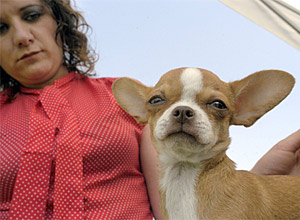 |
 |
 |
 News Around the Republic of Mexico | April 2007 News Around the Republic of Mexico | April 2007  
Mexico Imports Choice Chihuahuas From the US
 Chris Hawley - USA Today Chris Hawley - USA Today


| | Petunia, a Chihuahua dog, is groomed by her owner, Rosalinda Garcia, at a dog show in Cuatitlan, Mexico. The Chihuahua breed is from Mexico, but some Mexican pet stores are starting to import them from the United States. (Rebecca Holzer) |
Mexico City - First it was burros from Kentucky. Then, chile peppers from China. Now, Mexico is importing another of its national symbols: the pint-size dog known as the Chihuahua.

Some Mexican pet stores have begun selling U.S.-bred Chihuahuas to well-heeled customers drawn by the cachet of an American pedigree. Celebrity owners such as Paris Hilton have turned the tiny canines into a status symbol, and the "imported" tag heightens the allure, store managers say.

"Sometimes, customers want dogs with American papers and the (implanted) ID chips, and those are hard to get in Mexico," said Mayra Rodriguez, owner of the Mascota Pet Shop in Chihuahua City. "A lot of the time, these are the same bloodlines we sent over the border years ago."

About 30 percent of the Chihuahuas that Rodriguez sells come from breeders in the United States.

The Angel Pet Shop in Juarez regularly brings Chihuahuas over from neighboring El Paso because of a shortage of pedigreed dogs, manager Claudia Flores said. Pet Center in Tijuana offers imported Chihuahuas on a special-order basis, manager Angel Salas said.

And it's not just sellers near the border. Mexico's largest pet store chain, Mas-Kota, gets almost all its Chihuahuas from U.S. commercial breeders, purchasing manager Noe Escalona said.

It's the latest Mexican emblem to face foreign competition, joining:

- Hot peppers. A staple of Mexican cooking, one-third of dried chile peppers now come from Asia, according to Mexico's National Council of Chile Producers.

- Burros. The donkeys have become so scarce in some parts of Mexico that the government of Jalisco state is importing breeding stock from Kentucky.

- Poinsettias. The plant popular at Christmas is named for the first U.S. ambassador to Mexico, who brought them to the United States. Now, U.S. companies own the patents on many of the best-selling varieties.

For decades, the Mexican government strictly limited imports of all types in an effort to protect local businesses. But beginning with the 1994 North American Free Trade Agreement, Mexico has been opening its market to goods from the United States, Asia and Europe.

Mexico still supplies Chihuahuas to the United States, but many of them are low-quality dogs that are smuggled across the border, said Carol Jeffrey, a spokeswoman for the Chihuahua Club of America. Only 250 Mexican dogs of all breeds were exported legally to the United States last year, according to the Mexican Economy Secretariat.

Meanwhile, the popularity of U.S.-bred dogs is booming. Imports from the United States to Mexico doubled from 2,102 dogs in 2002 to 4,402 in 2006.

Dog experts say Mexico's strengthening economy has led to an increase in pet ownership. In Mexico City, one of the wealthiest parts of the country, about 66 percent of households have a pet, according to a 2005 poll by the Mitofsky consulting company. The door-to-door poll of 400 people had a margin of error of plus or minus 5 percentage points.

"As a veterinarian, I see people bringing animals in for treatment more often, whereas before they didn't have money for that," said Miguel Angel Robles, head of the registry at the Mexican Dog Lovers Federation, the biggest such association in Mexico. "The economy is more stable now, so people have a little more disposable income for keeping a dog or a cat."

It's a homecoming of sorts for the diminutive breed, which first inspired the curiosity of foreigners after Spanish conquistadors described seeing them in the Aztec capital of Tenochtitlan, now Mexico City. American travelers discovered the dogs in border towns of Chihuahua state and started buying them as souvenirs. | 
 | |
 |



